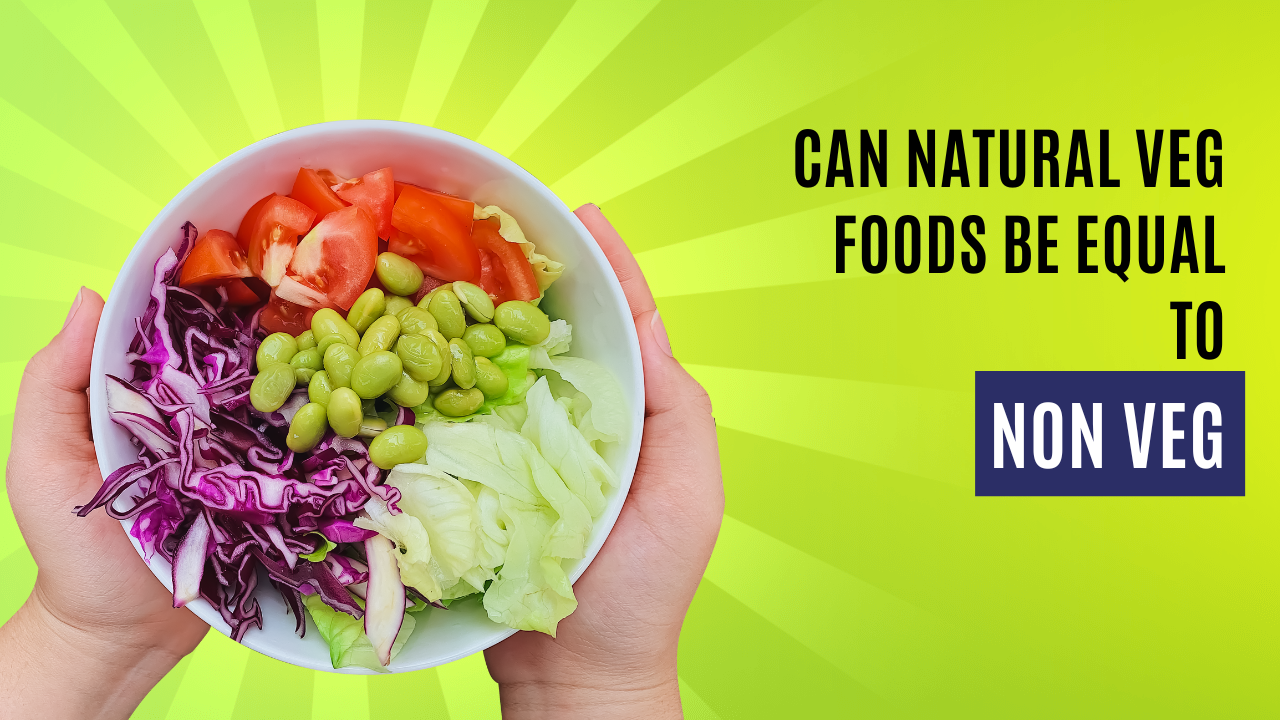——-< Make healthy recipes with Click here (Paid link) #Ad #CommissionsEarned #AmazonAssociates —->
In today’s health-conscious world, many people are turning to plant-based diets for a variety of reasons, including ethical, environmental, and health concerns. However, there is a common misconception that non-vegetarian foods like chicken, mutton, and beef are superior in terms of protein, iron, and calcium content compared to vegetarian options. But is this really true? Can natural veg foods be equal to non-veg foods in terms of nutritional value? Let’s explore some natural veg foods that are just as nutritious as their non-veg counterparts.
To ensure a diet rich in protein, calcium, fiber, and iron while following a vegetarian lifestyle, it is essential to include a variety of nutrient-dense foods. Here are some excellent vegetarian sources for each of these nutrients:
1. Lentils
- Protein: 18 grams per cooked cup
- Fiber: 15.6 grams per cooked cup
- Iron: 6.6 mg per cooked cup
- Calcium: 56 mg per cooked cup
- Benefits: Lentils are versatile and can be used in soups, stews, salads, and veggie burgers.
2. Chickpeas (Garbanzo Beans)
- Protein: 15 grams per cooked cup
- Fiber: 12.5 grams per cooked cup
- Iron: 4.7 mg per cooked cup
- Calcium: 80 mg per cooked cup
- Benefits: Use in hummus, salads, stews,
or roasted as a snack.
3. Tofu
- Protein: 20 grams per 100 grams
- Calcium: Up to 350 mg per 100 grams (varies based on brand and fortification)
- Iron: 5.4 mg per 100 grams
- Fiber: 1.5 grams per 100 grams
- Benefits: Can be used in stir-fries, soups, salads, or grilled.
4. Quinoa
- Protein: 8 grams per cooked cup
- Fiber: 5 grams per cooked cup
- Iron: 2.8 mg per cooked cup
- Calcium: 31 mg per cooked cup
- Benefits: Excellent as a base for salads, bowls, or as a side dish.
5. Spinach
- Protein: 5.4 grams per cooked cup
- Fiber: 4.3 grams per cooked cup
- Iron: 6.4 mg per cooked cup
- Calcium: 245 mg per cooked cup
- Benefits: Use in salads, smoothies, soups, or sautéed.
6. Kale
- Protein: 3.5 grams per cooked cup
- Fiber: 2.6 grams per cooked cup
- Iron: 1.2 mg per cooked cup
- Calcium: 179 mg per cooked cup
- Benefits: Great in salads, smoothies, and as sautéed greens.
7. Almonds
- Protein: 6 grams per 1 ounce (28 grams)
- Fiber: 3.5 grams per 1 ounce
- Iron: 1.1 mg per 1 ounce
- Calcium: 76 mg per 1 ounce
- Benefits: Can be eaten as a snack, added to cereals, or used in almond butter.
8. Chia Seeds
- Protein: 4.7 grams per 2 tablespoons
- Fiber: 10 grams per 2 tablespoons
- Iron: 2.2 mg per 2 tablespoons
- Calcium: 177 mg per 2 tablespoons
- Benefits: Great in smoothies, puddings, or sprinkled on cereals and salads.
9. Broccoli
- Protein: 2.6 grams per cooked cup
- Fiber: 5.1 grams per cooked cup
- Iron: 1 mg per cooked cup
- Calcium: 62 mg per cooked cup
- Benefits: Versatile in stir-fries, salads, and as a steamed side.
10. Black Beans
- Protein: 15 grams per cooked cup
- Fiber: 15 grams per cooked cup
- Iron: 3.6 mg per cooked cup
- Calcium: 46 mg per cooked cup
- Benefits: Ideal for soups, salads, and as a base for veggie burgers.
11. Sesame Seeds
- Protein: 4.7 grams per ounce (28 grams)
- Fiber: 3.6 grams per ounce
- Iron: 4.1 mg per ounce
- Calcium: 277 mg per ounce
- Benefits: Can be added to salads, tahini, or sprinkled on various dishes.
12. Edamame (Young Soybeans)
- Protein: 17 grams per cooked cup
- Fiber: 8 grams per cooked cup
- Iron: 3.5 mg per cooked cup
- Calcium: 97 mg per cooked cup
- Benefits: Perfect as a snack, in salads, or stir-fries.
——-< Save your time in kitchen Click here (Paid link) #Ad #CommissionsEarned #AmazonAssociates —->
Combining for Nutrient Optimization
Combining these foods can help ensure you get a balanced intake of protein, calcium, fiber, and iron. For example:
- Quinoa and Black Beans: Together, they provide a complete protein and are rich in fiber and iron.
- Spinach and Tofu: Spinach boosts calcium and iron, while tofu adds protein and additional calcium.
- Chia Seeds and Almonds: Great for smoothies or sprinkled on yogurt, combining protein, calcium, fiber, and iron.
Conclusion
Incorporating a variety of these nutrient-dense vegetarian foods into your diet will help ensure you meet your protein, calcium, fiber, and iron needs. A balanced approach with different combinations throughout the day can provide comprehensive nutritional benefits and support overall health.
Meta-description:
Discover natural veg foods that are equal in protein, iron, and calcium to non-veg foods like chicken, mutton, and beef. Explore the plant-based options that can rival animal products for a nutritious diet.
#vegfood #nonveg #healthyfood #veganfood #Nutritional #healthtips #datacollect #foodblog


